|
|
|
Sort Order |
|
|
|
Items / Page
|
|
|
|
|
|
|
| Srl | Item |
| 1 |
ID:
113786
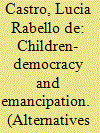

|
|
|
|
|
| Publication |
2012.
|
| Summary/Abstract |
Modern conceptions of politics are intrinsically related to theories of subjectivity shaped by a teleological narrative expressing claims about instrumental rationality, moral and psychological autonomy, and individualized selfhood. Consequently, children have been considered to be lacking both the credentials necessary to act and participate in politics and the subjective dispositions of proper political subjects. This overwhelming conception of subjectivity as a purposefully and rationally oriented individual produced by a sovereign politics may be contested. Empirical data deriving from recent research on children's and youth's participation in schools are presented to show how children and youth effectively manage "to speak" and build a different point of view from those of adults about their school experience. Such research provokes analysis of insidious but unpublicized forms of domination and resistance. The inclusion of children in politics seems to depend on our capacity to overcome taken-for-granted truths about adult-centered society.
|
|
|
|
|
|
|
|
|
|
|
|
|
|
|
|
| 2 |
ID:
182941
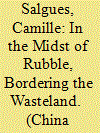

|
|
|
|
|
| Summary/Abstract |
Drawing from two ethnographic studies of children, one in a former industrial neighbourhood in the process of demolition in Shanghai, and the other in a rural town in Guangdong, this article explores the relationships children form with the landscape of ruins as they wander about with the aim of identifying the opportunities these offer in terms of games, freedom, and sharing, etc. The article analyses two different dynamics in the types of ruins and the experiences associated with them: concentration and dispersion. The structural geography and qualitative demography that emerge from this are barely mentioned in Chinese public debate, in its categories (children of “migrant workers” or “left-behind” children), its problems, and its very negative representations, but whilst they underline the unequal divisions in society, they also reveal a richness of experience that is far from being necessarily unhappy.
|
|
|
|
|
|
|
|
|
|
|
|
|
|
|
|
| 3 |
ID:
186948
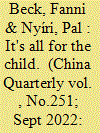

|
|
|
|
|
| Summary/Abstract |
Middle-class parents in China are increasingly torn between the need to secure their child's future in an environment where competition starts in kindergarten and parenting ideologies focusing on the child's individuality, creativity and freedom. Our study, based on ethnographic fieldwork among middle-class Chinese migrants in Budapest, shows that one result of this tension is a new wave of emigration that is justified in terms of securing a relaxed, healthy and free environment for the child. These migrants consciously reject what they see as a materialistic and dehumanizing social environment in China and pursue a “European” lifestyle that they imagine as wholesome and human-centred; yet while they rejoice in the “happiness” of their children, they retain a deep-seated anxiety about their children's future. Thus, the search for a mentally and physically wholesome environment consonant with China's discourse of national revitalization becomes decoupled from its original agenda and triggers a new trend in international mobility. This study illustrates how the broader tensions in the relationship between China's middle class and the state are externalized to the global stage.
|
|
|
|
|
|
|
|
|
|
|
|
|
|
|
|
| 4 |
ID:
188408
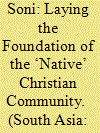

|
|
|
|
|
| Summary/Abstract |
This article traces the historical trajectory of the work of the Church Missionary Society (CMS) in orphanages in north and western India through two case studies of the important and well-documented CMS orphanages, the Secundra and Sharanpur Orphanages. In doing so, the article makes two historiographical contributions. Firstly, it brings to the forefront the significance of famine orphans and orphanages in the global evangelical Christian project. Secondly, contrary to the overwhelming focus on the sentimentalisation of childhood in historical literature, it asserts that along with factors that point towards such sentimentalisation, other aspects also contributed to the decline in popularity of orphanage work among CMS missionaries.
|
|
|
|
|
|
|
|
|
|
|
|
|
|
|
|
| 5 |
ID:
184043
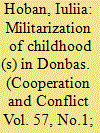

|
|
|
|
|
| Summary/Abstract |
This essay critically examines how the militarization of childhood(s) takes place in the Luhansk and Donetsk People’s Republics. The intensification of hostilities in Eastern Ukraine in mid-2014 has had a profound impact on local populations, particularly children. While no systematic recruitment and participation of children in conflict has been reported, childhood has become what Agathangelou and Killian would characterize as a ‘site for displacement and maneuvering for militarization.’ Drawing on feminist methodologies, I examine processes of the militarization of children’s everyday lives. This article investigates a range of ways in which authorities of proto-states in the Donbas region address children as participants and potential collaborators in the processes of militarization. In my analysis, I examine how war and preparation for it are simultaneously co-constituted by the geopolitical—legitimation of new proto-states—and everyday practices, such as engaging with school curricula, visiting museums, and (re)inventing historical narratives. Understanding of mechanisms that militarize childhood and how children become subjects and objects of militarization allows for a critical analysis that reveals spaces of everyday violence. This article, therefore, enhances our understanding about the intersections of childhood, militarism, and security.
|
|
|
|
|
|
|
|
|
|
|
|
|
|
|
|
| 6 |
ID:
185244


|
|
|
|
|
| Summary/Abstract |
Avoidance of civilian casualties increasingly affects the political calculus of legitimacy in armed conflict. “Collateral damage” is a problem that can be managed through the material production of precision, but it is also the case that precision is a problem managed through the cultural production of collateral damage. Bearing decisively on popular perceptions of ethical conduct in recourse to political violence, childhood is an important site of meaning-making in this process. In pop culture, news dispatches, and social media, children, as quintessential innocents, figure prominently where the dire human consequences of imprecision are depicted. Children thus affect the practical “precision” of even the most advanced weapons, perhaps precluding a strike for their presence, potentially coloring it with their corpses. But who count as children, how, when, where, and why are not at all settled questions. Drawing insights from what the 2015 film, Eye in the Sky, reveals about a key social technology of governance we have already internalized, I explore how childhood is itself a terrain of engagement in the (un)making of precision.
|
|
|
|
|
|
|
|
|
|
|
|
|
|
|
|
| 7 |
ID:
086159


|
|
|
|
|
| Publication |
2009.
|
| Summary/Abstract |
For some years after I arrived in America to study, when my mother called from Tehran every fornight on Friday no matter what, illness or shortage or war or bombs, I would tell her to put the phone down and ring the outside doorbell of our house so that I could hear my dog, Lady, bark in response.
|
|
|
|
|
|
|
|
|
|
|
|
|
|
|
|
| 8 |
ID:
164324
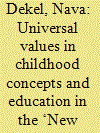

|
|
|
|
|
| Summary/Abstract |
The tension between universal and local values is reflected in educational discourse in every period and society. The education of children serves to strengthen national identity and local culture in the face of globalising trends. This article examines the position and influence of western childhood images and pedagogical concepts, developed mainly from the eighteenth century onward, on the concepts and attitudes of educators of the Jewish national revival in the Land of Israel at the beginning of the twentieth century. Its focus is on the period in which the Hebrew educational system was founded, and children were valued as the future generation that would materialise the adults’ national hopes.
|
|
|
|
|
|
|
|
|
|
|
|
|
|
|
|
| 9 |
ID:
187872


|
|
|
|
|
| Summary/Abstract |
This study examines the long-term effects of childhood left-behind experience on human capital outcomes across two generations in China. Using data from the China Family Panel Studies (CFPS), we find evidence that adults with left-behind experience in early life have fewer schooling years, lower cognitive test scores, a lower Big Five personality traits index, but a higher internal locus of control. Meanwhile, they are more likely to report underweight, chronic diseases, depression, and lower levels of perceived health and happiness. Our findings of the negative consequences on personality traits and health outcomes are robust to a battery of specification and validity tests. These effects also differ markedly by adults' gender, birth cohort, hukou status, and the characteristics of left-behind experience (i.e., type, timing, and duration). Further, our results also suggest a potential intergenerational transmission mechanism in which human capital loss is induced by one's early-life exposure to parental absence. Specifically, one's childhood left-behind experience is also inversely associated with their offspring's outcomes such as Big Five noncognitive skills, birth weight, and height-for-age z-score. Although adults with left-behind experience are inclined to spend more time with offspring compared with their non-left-behind counterparts, they also tend to have significantly poorer household socioeconomic outcomes and less offspring educational investment.
|
|
|
|
|
|
|
|
|
|
|
|
|
|
|
|
|
|
|
|
|